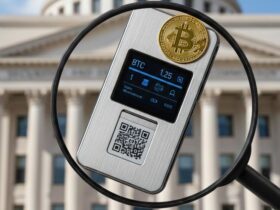The question arises about the information of its users that could be shared with the local Treasury.
Binance can be used to adhere to the “money laundering” in force in Argentina.
Although Binance has been one of the main cryptoasset exchanges used by the Argentine public for years, since last September it officially became a Virtual Asset Service Provider (PSAV) registered with the National Securities Commission ( CNV) of Argentina.
By entering the CNV website you can see that Binance obtained registration number 76:

The registration was obtained by “Binance Services Latinoamerica SA de CV”, a company that is not located in Argentina but abroad.
But, for its users, What are the implications of Binance being already registered with the Argentine authorities?
PSAV registration
The Argentine standard qualifies as PSAV any subject that, as a business, offers, for example, custody services and/or purchase and sale of virtual assets. And in turn, it forces these subjects to register in the PSAV Registry administered by the CNV.
Even foreign exchanges, such as Binance, must register in the Registry if they carry out any of the activities related to a PSAV in Argentina. And it is established that any of these activities is carried out in Argentina when the subject from abroad:
- Use any “.ar” domain to carry out your activities.
- Have a “fiat ramp” in Argentina that allows you to receive funds or assets from Argentine residents to carry out activities.
- Have a clear address to residents in Argentina.
- Advertise clearly to residents of Argentina.
- Have a turnover in Argentina that exceeds 20% of your total business volume.
One of the main obligations that arise when registering in the Registry is compliance with local anti-money laundering regulations, which includes presentation of systemic reports to the Financial Information Unit (UIF), the local body in charge of combating money laundering. For example, one of these is the “Report of operations carried out with Virtual Assets”, where all operations carried out with Virtual Assets equal to or greater than an amount of approximately USD 1,000 are reported.
Information regime before the Tax Authorities
And will Binance also have to inform the Argentine Treasury about the operations carried out by its users?
In Argentina there is a tax information regime that exchanges must comply with, reporting monthly to the tax agency (AFIP) information of those users who had an amount of income or expenditure in their account during the month of at least USD 340, or the balance in the account at the end of the month was at least USD 580.
However, Binance is a company that is not yet based in the country and that offers its services from abroad. In this way, at least for now, nothing would indicate that it is complying with said information regime. However, given its recent registration in the PSAV Registry, added to its greater presence in the country, It is highly probable that in the not too distant future it will begin to report to the treasury.
Money laundering
As commented in a previous article published in CriptoNoticias, an “Asset Regularization Regime” is in force in Argentina. popularly known as “money laundering”.
This regime basically consists of a tax amnesty and allows a person or company to externalize the possession of assets not timely declared to the Treasury. Among these assets are cryptoassets: for example, in the case of laundering cryptoassets for an amount less than USD 100,000, no penalty will be paid, and if that amount is exceeded, the “special laundering tax” will be 5% on the amount that exceeds USD 100,000.
One of the key points of this regularization regime is the obligation to have the cryptoassets that are intended to be laundered deposited in a PSAV registered with the CNV. And from now on, since Binance is registered in Argentina, it is an option for those who want to access money laundering and use this exchange.
Disclaimer: The views and opinions expressed in this article belong to its author and do not necessarily reflect those of CriptoNoticias. The author’s opinion is for informational purposes and under no circumstances constitutes an investment recommendation or financial advice.






Leave a Reply